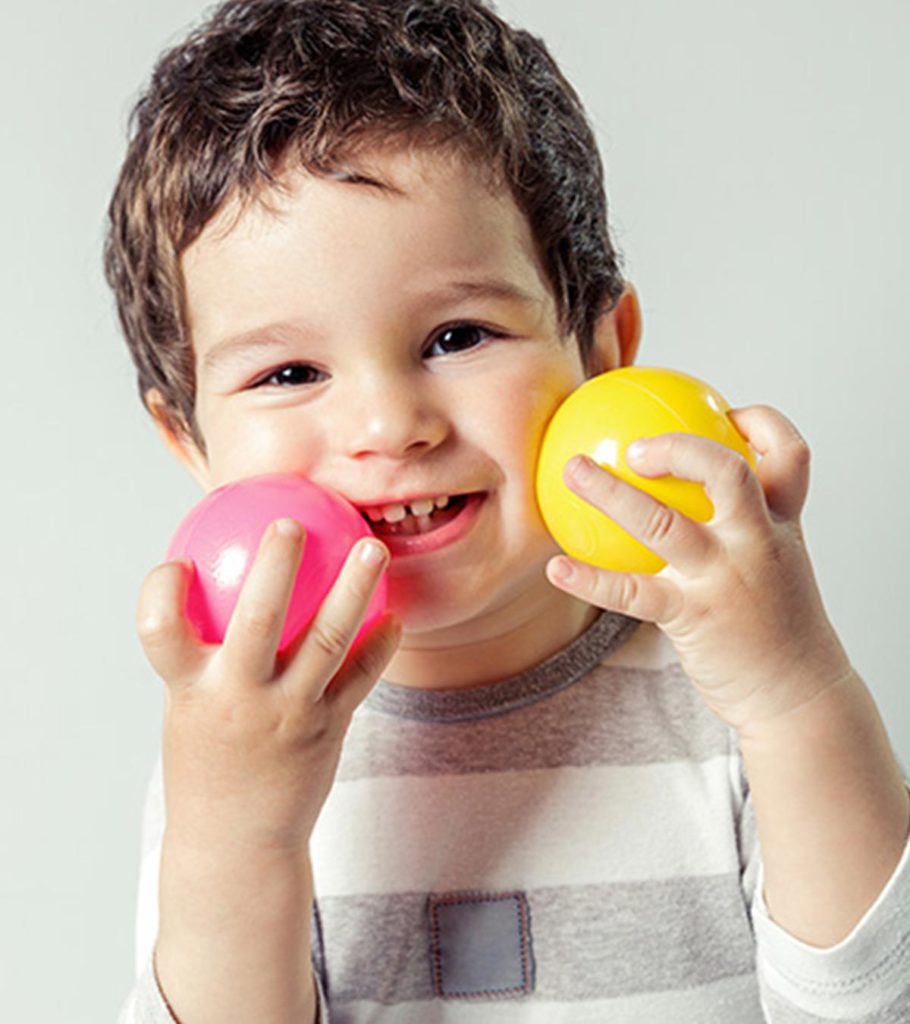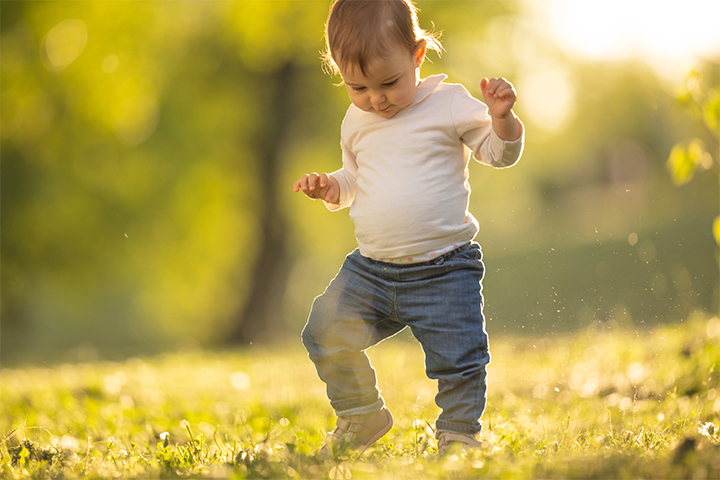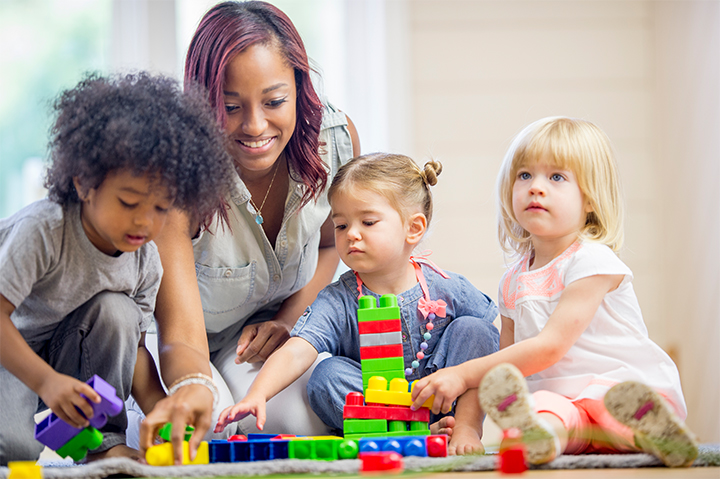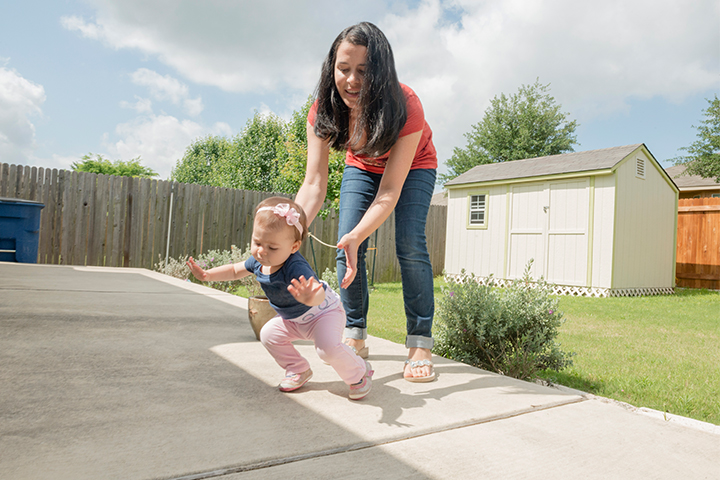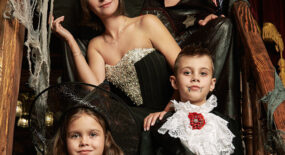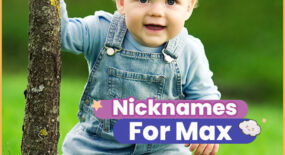An 18-month-old isn’t a baby anymore. Rather, they are toddlers who can say several words, scribble on their own, walk alone, eat with a spoon, and drink with a cup. There are several such 18-month-old-baby milestones that a baby achieves at their age, thus preparing them to grow and develop healthily and enter childhood.
Here, we list milestones for their developing cognitive skills, physical growth, language, and communication that an 18-month-old achieves. We also provide tips on helping your toddler achieve these milestones smoothly.
18-Month-Old’s Milestone Chart
| ACHIEVED DEVELOPMENTAL MILESTONES | EMERGING DEVELOPMENTAL MILESTONES |
|---|---|
| Remembers names of a few objects | Will remember names of several objects and familiar people |
| Walks alone | Can walk tiptoe and also run |
| Throws temper tantrum | Will show defiant behavior |
| Starts having pretend play | Will spend a lot of time with imaginative play |
| Loves social play with familiar faces | Will accommodate new individuals |
| May walk up a few stairs | Can climb over small and short furniture |
| Speaks single words | Can string words together to form simple sentences |
| Follows one-step instructions | Can follow two or even three-step instructions |
| Throws balls albeit randomly | Can throw ball overhand and with more precision |
| Scribbles randomly | Can draw straight lines and circles |
An 18-Month-Old’s Developmental Milestones
A baby displays development in three primary areas – cognitive, physical, and social, and emotional. Each developmental area has its individual developmental milestone checklist.
Cognitive Developmental Milestones
These are milestones about an 18-month-old’s cognitive abilities, brain development, and thinking prowess.
- Remembers the purpose of several objects: The little one now understands the functions of several household objects. For instance, the baby knows that a telephone is for talking. When you hand them a spoon while eating, they know that it is used for feeding themselves.
- Matches pair of objects: Identical toys will be placed together, and they will always carry their shoes in pairs. The toddler remembers that two identical objects form a pair (1).
- Follows one-step commands: When told to ‘sit down’ the baby sits, when said ‘come here’ they get up and walk towards you. The baby can now interpret instructions and respond promptly to them.
- Knows the name of objects or parts of the body: When asked to point to their nose, the baby points correctly to the body part. They can also identify a particular object among several items. A good object-noun association helps facilitate this ability.
- May imitate complex actions: An 18-month-old will imitate chopping a vegetable if they see their mom cooking or pretend to shave when they see their dad shaving. The baby keenly observes and tries to replicate the actions by frequently imitating their behavior.
- Points at something that he wants: If they want you to fetch their toy from the shelf, then they will point towards the toy. Babies now know that pointing at something indicates an explicit interest.
- Scribbles when handed a crayon: The 18-month-old scribbles and attempts to draw on paper when given a crayon. They cannot make meaningful drawings yet scribbles quite ardently (2).
- Displays interest in toys and pretend plays: The baby picks up a stuffed animal and caresses it with care or pretends to talk to it. This form of pretend play leads to richer imaginative play later in life.
Physical Development Milestones
These milestones are about a baby’s physical growth, developing fine motor skills, and general muscular abilities.
- Walks alone without support: For the first time, the baby lets go of support and walks alone correctly (3). There is a better body balance with the strength to enable this significant landmark. Since the baby can ‘toddle’, which is walking with a slight wobble, they are also called a toddler. Kayla Buell, a motherhood and lifestyle blogger, says her son could walk around in circles at 18 months. “He climbs on everything, he climbs up the stairs, he is very fast.. he is hard to keep up with at this point, but this is the funniest stage because you are starting to see those little wheels turning, and he is learning a bunch of things (i),’’ she adds.
- Pulls toys while walking: They do not just walk but also pull stringed toys, such as a toy car while walking.
- May run and walk up the steps with support: Some toddlers may even run albeit in short bursts or at a slow pace. The little one may also walk up and down the stairs using the support of the handrails. Stronger leg muscles can facilitate this milestone.
- Can throw a ball: The aim could be incorrect, but at least they know how to throw a ball. Better musculature and increased strength of the shoulders help to do this action.
- Can help undress: The 18-month-old can help dress or undress themselves.
- Drinks from the cup and eats with a spoon: The 18-month-old puts aside the sipper as they start drinking from a cup. They will also be able to hold a spoon properly and guide it to their mouth.
- Will have at least ten teeth: The process of teething will be accelerated.The ten teeth will be the lower and upper central incisors, lower and upper lateral incisors, and the lower first molars. Some babies may even have the upper first molars by 18 months, and then the total teeth count will be 12 (4) (5).
The development of gross motor skills plays an important role in their physical growth and development.
Social And Emotional Developmental Milestones
These are milestones about the baby’s social skills, emotional temperament, and the ability to use language.
- Throws temper tantrums: Behold the first temper tantrums! The baby got fussy earlier, but this time it is a real tantrum. For instance, if earlier you took away a toy from them, they would cry and act fussy. But now, they will pretend to cry loudly, roll down on the floor, and even throw their hands up in the air.
- May respond to a greeting with “Hi”: A toddler may pick up some greetings from parents or caretakers. As a result, the next time you say “Hi”, you may get an enthusiastic “Hi” back.
- Laughs in response to someone laughing: During a social gathering, when everyone laughs, the 18-month-old joins the roar. There is now an understanding that laughing is essential for social bonding, and the 18-month-old will practice it often.
- Gets nervous around strangers: When around new faces, the baby may seem a bit nervous and wary of their presence. If the stranger attempts to come close or touch the baby, they may start crying.
- May become clingy to parents in new situations: The 18-month-old will cling to their parents when visiting a new place, when around unknown faces, or when they are just unsure of what is happening.
- Displays affection to familiar people: Those close to the baby will be rewarded with adorable hugs and smiles. The toddler would display ardent fondness, especially to the primary caretakers and siblings.
- Has social play: The 18-month-old will be happy to play with close ones such as siblings and grandparents.
- Can speak some single words:The toddler now knows about 10-20 single words that help communicate their feelings or thoughts. These words would be basic, and the pronunciation would be gibberish, but still, the baby makes a discernible sound of the word. Buell says her son says more than 22 words and she keeps note of the words. “Some of the words he says are mama, dada, bubbles, no, which is his favorite word, one, two, three, aawa, banana, elephant, etc.,” she says.
- Shakes head from side to side to say “No”: The baby moves their head from side to side to convey “No.” Therefore, when you ask them if they want a bottle and if they are not hungry, they will shake their head from side to side.
Children begin socializing with their parents and family. However, each baby is unique and may develop at a pace different from his peers. However, some red flags are definite indicators of delay.
When To Be Concerned?
According to the US Centers for Disease Control and Prevention (CDC), the following could be the signs of developmental delay in an 18-month-old’s growth.
- Does not walk
- Does not point at objects or persons of interest
- Makes no effort to imitate actions
- Has problems recognizing and recollecting familiar objects and people.
- Knows less than six words
- Does not seem to acknowledge the presence of a stranger.
- Loses skills they once had
Take your baby to a doctor right away if they show any of the above signs. The American Academy of Paediatrics (AAP) recommends screening a baby for developmental delays, including autistic spectrum disorders, at the age of 18 months (6) (7). However, if the baby does not have any disorders, then parents can ensure that their 18-month-old grows the healthy way.
How Can Parents Help In The Development Of An 18-Month-Old?
Here are five tips to help your baby grow better:
- Give adequate opportunities to walk: Your baby now likes to stand on their feet and walk rather than crawling. You could indulge in activities or games that encourage them to walk.
- Have meaningful conversations: Babies understand “No” and also several other single words. Keep your conversations purposeful and cut down on baby talk. Ask the baby questions, give them options such as “Yes” or “No.” This will help hone the communication skills of an 18-month-old and also help them following directions.
- Set some rules: Remember, the toddler’s temper tantrums would greet you often around this time. So, set some rules. For instance, no play and straight to bed after 8pm and no high-sugar candies, but can have some extra fruit. Rules help set order and mitigate the chances of a stormy tantrum.
- Social play is important: Interaction with other toddlers and family members helps baby learn to forge social bonds. Therefore, social play is crucial.
- Let the baby be independent: The 18-month-old will love to eat on their own, drink water from the cup, and perhaps tie their shoelaces once they see you do it. They may not always get it right, but it is good to let the baby give a try at these things while you keep a watch.
Walking and using basic words are major 18-month-old baby milestones. However, each baby achieves these growth landmarks at a different pace depending on the stimulation and motivation they have from their surroundings. Do not force your little one to achieve any milestone. Instead, allow them to grow at their own pace by exploring and comprehending the world around them. Love, care, and encouragement could stimulate achieving milestones in babies. You may ignore slight delays but seek pediatric consultation if your baby has clear signs of delay in developmental milestones.
Have any activities to aid the development of an 18-year-old? Then share them with other parents in the comments section below.
Key Pointers
- An 18-month-old displays several cognitive, physical, emotional, and social developments.
- At this age, babies can recognize familiar objects and people, walk without support, and laugh when someone else laughs.
- They may also develop stranger anxiety and begin throwing temper tantrums.
- If your child has not started walking or doesn’t point to persons or objects, consult a pediatrician.
- Encouraging social play and interactions and providing ample space for walking, talking, and exploring can aid in their development.
Watch as your toddler takes their first steps towards independence! Watch this exciting video and learn about the exciting milestones of this transformative phase with Aspirus.
